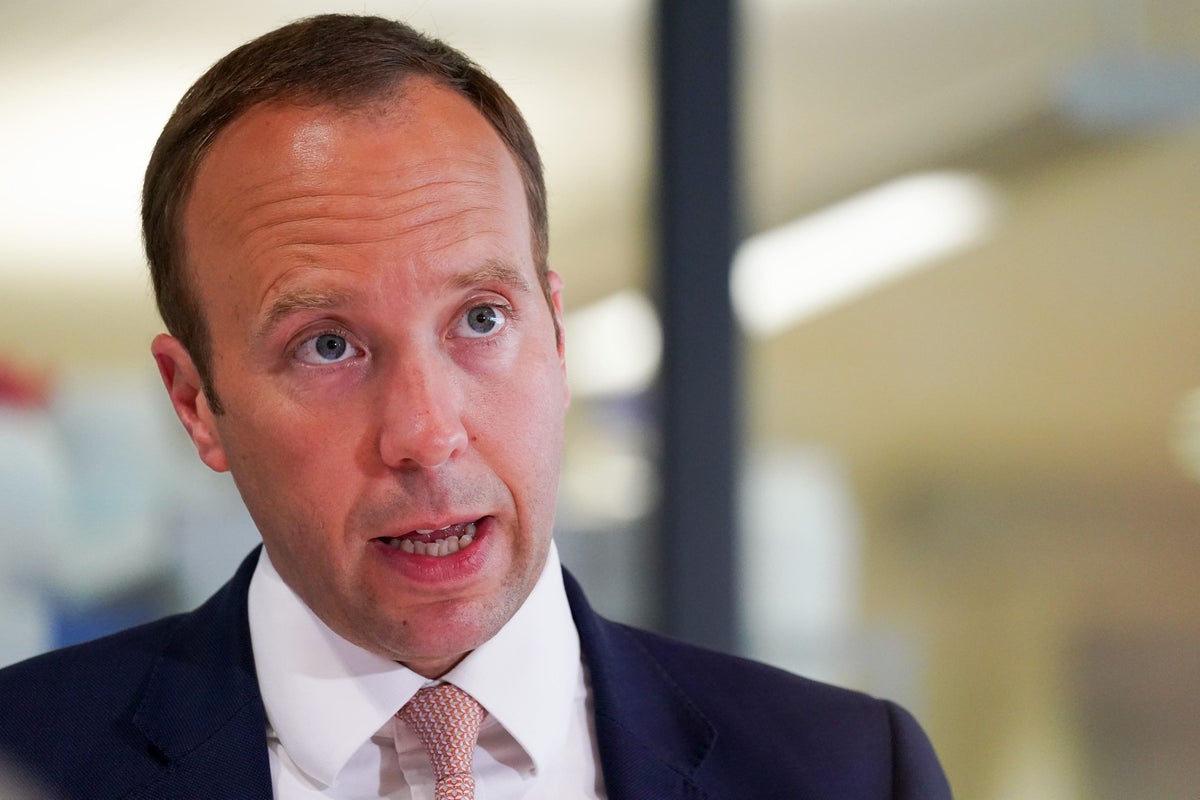
Matt Hancock wanted to personally decide – rather than doctors or the public – “who should live and who should die” if hospitals became overwhelmed by coronavirus patients, the former NHS boss has said.
On a fourth consecutive day of bombshell evidence at the official Covid inquiry, Lord Simon Stevens, who led NHS England until 2021, made the startling claim, adding: “Fortunately, this horrible dilemma never crystallised.”
Mr Hancock made the comments after ministers were told in mid-February 2020 that Covid could lead to as many as 840,000 deaths in a “reasonable worst-case scenario”, the inquiry was told. The prediction sparked the “unresolved but fundamental ethical debate” about who should be prioritised for NHS care and how this should be decide.
In his witness statement, the peer said: “The secretary of state for health and social care took the position that in this situation he – rather than, say, the medical profession or the public – should ultimately decide who should live and who should die.”
Adding that it would be “highly undesirable”, the peer told the hearing he “wanted to discourage the idea that an individual secretary of state, other than in the most exceptional circumstances, should be deciding how care will be provided”.
Evidence submitted to the inquiry showed ministers performed a planning exercise for Covid based on a ‘reasonable worst case’ in which 840,000 people died— (Covid-19 Inquiry)
After the evidence, former No 10 chief of staff Dominic Cummings launched yet another blistering attack on Mr Hancock, a day after his own grilling over his expletive-laden WhatsApp messages during the pandemic.
Mr Cummings asked on Twitter whether the true problem was either him “calling Hancock ‘a lying c*** killing people’” or “Hancock actually being a lying c*** killing people”.
Separately, during Lord Stevens’ evidence, a series of WhatsApp messages shared with the inquiry revealed that Mr Cummings repeatedly pushed Boris Johnson to sack Mr Hancock, who now sits as an independent MP following his appearance on ITV’s I’m A Celebrity… reality show.
At one stage, Mr Cummings claimed Mr Hancock had “lied his way through this and killed people and dozens and dozens of people have seen it”. Ex-civil servant Helen MacNamara, who served as deputy cabinet secretary, also claimed in her evidence that Mr Hancock displayed “nuclear levels” of overconfidence and a pattern of reassuring colleagues the pandemic was being dealt with in ways that were not true.
Lord Stevens largely refused to criticise the former health secretary during his appearance, in contrast to other figures who appeared before Baroness Heather Hallett’s probe this week, including Mr Cummings and Ms MacNamara.
“There were occasional moments of tension and flashpoints, which are probably inevitable during the course of a 15-month pandemic but I was brought up always to look to the best in people,” he said.
Under questioning from inquiry counsel Andrew O’Connor KC, he said that “for the most part, yes” he could trust Mr Hancock.
Lord Stevens also told the inquiry that ministers “sometimes avoided” Cobra meetings chaired by Mr Hancock at the start of the pandemic, adding that they were “not optimally effective”.
Asked if that was because of Mr Hancock, Lord Stevens said: “I am not saying that was cause and effect, but that was the fact of the matter.”
Rounding off a tumultuous week at the Covid inquiry, in which witnesses laid bare a macho, misogynistic, over-confident and chaotic culture in Downing Street during the pandemic, the Department for Health’s former top civil servant sought to defend Mr Hancock’s character.
Sir Christopher Wormald said he had been “surprised”, and expects the former health secretary will be as well by the extent to which senior officials mistrusted him. And while he recalled raising the complaints against Mr Hancock in one conversation with him, Sir Christopher said Mr Hancock would “overpromise” but was not a liar.
In his own testimony, Sir Christopher went on to say the Government was a "week late" with all non-pharmaceutical interventions (NPIs) in the run up to the first lockdown.
He also said the subsequent November lockdown was implemented too late and that was his view at the time.
He added: "With hindsight, we were at least a week late at all points of the NPI decisions. I agreed with the decisions at the time and timing.
"But, looking back, we should have done each things on the 12th, 16th, 23rd ... at least a week earlier."
And he revealed concerns about the mixing of factual and political advice in the run up to Covid, as happened before the Iraq war.
The former Department of Health permanent secretary raised concerns on 18 March 2020, that political special advisers were attending Sage meetings.
Sir Christopher told the Covid inquiry the advice coming out of the group changed without “an explanation of new data”.
He said: “I was concerned about the purity of the sage advice, which was going to the prime minister because Spads (special advisers) were available.
“One of the key findings of the various reports around the Iraq war, including the Chilcott one, was the mixing up of the technical factual advice and the political advice.”






